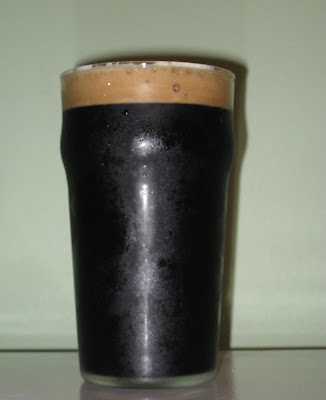Dry Stout is a misunderstood style, particularly when the general public is involved. (But isn't that always the case?) Sometimes called Dry Irish Stout due to its historical connection with and popularity on the Emerald Isle (Guinness, Murphy's and Beamish, Irish all, are the examples perhaps most likely to come to mind, in that order), here's a beer that tends to be light-bodied and low in alcohol (the three aforementioned brands being no exception) and yet is widely perceived as being the exact opposite – big, heavy, strong, overpowering.
Why? The first reason, of course, would be the color – jet-black and intimidating, not like those friendly, easy-drinking mega-lagers folks are used to. Then there's the flavor – strong (that is to say, existent), roasty, quite bitter. And finally the mouthfeel – a blend of CO2 and nitrogen (something many commercial examples, including the three above, feature) imparts a creamy, velvety texture to Dry Stout that is often taken for thickness, heaviness.
Of course, we homebrewers and beer snobs are wiser than this. Apart from its flavor – yes, Dry Stout is dark, coffee-like, rather bitter – there is in fact little in the way of alcohol content or body to put Dry Stout in the category of real heavyweights like Imperial Stout, Doppelbock and Barleywine.
Call Dry Stout session beer for a chilly day. Or for a hot day. Just don't call it "motor oil," and don't let your scaredy-cat pals call it that, either.
Here's my Dry Stout, very heavily based (hops and yeast being the differences) on a well-regarded recipe by Bob Girolamo.
 The details:
The details:OG 1.056 FG 1.013
ABV 5.7% AA 76.5%
IBUs 44 SRM 33
80% Crisp Marris Otter
8% Flaked Barley
8% Roasted Barley
4% Crystal 120
1 oz Magnum 60 mins (44 IBUs)
US-05
As you can see, the alcohol content on this one is pretty high by Dry Stout standards. Partly that's because I hadn't gotten my mill yet so I had ordered precrushed grains from an online supplier. As such, I wasn't sure what kind of efficiency to expect, so I wanted to err on the high end with my order. (I ended up with ~74% efficiency. Not bad.)
The name, selected by my girlfriend, is an homage to the recent Guinness advertising campaign, although I will note that this brew was never intended as any kind of Guinness clone, and was served on just CO2.
Not surprisingly, based on accolades directed at Bob G.'s recipe, this one turned out very tasty. A big hit among my girlfriend (who loves Dry Stouts) and everyone else who came over to sample it. I didn't perform any experiments on dyed-in-the-wool light-beer drinkers, but based on my friends' feedback (surely they're not just being polite??) I'd venture to say Dry Stout's potential for wide appeal is not to be underestimated.
On a more somber note, this particular beer didn't make it through a recent party. It had a good life, and put many a smile on many a people's face. Wish I had a glass right now...




